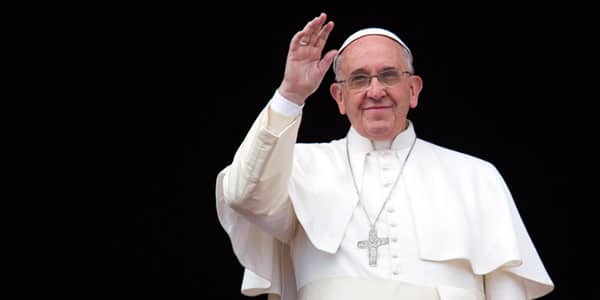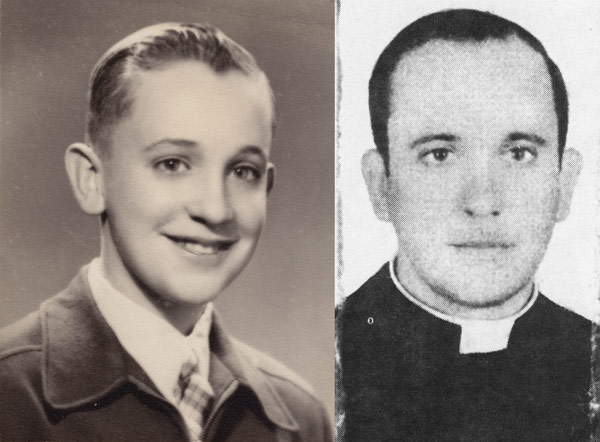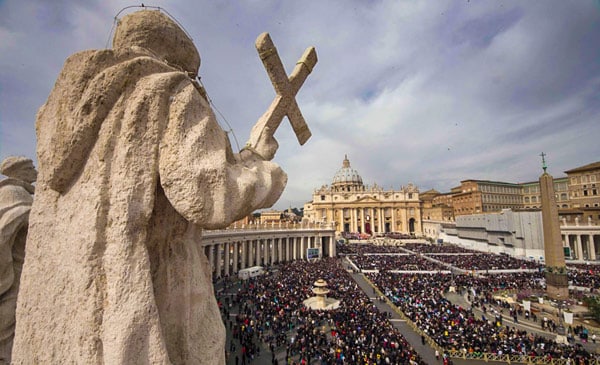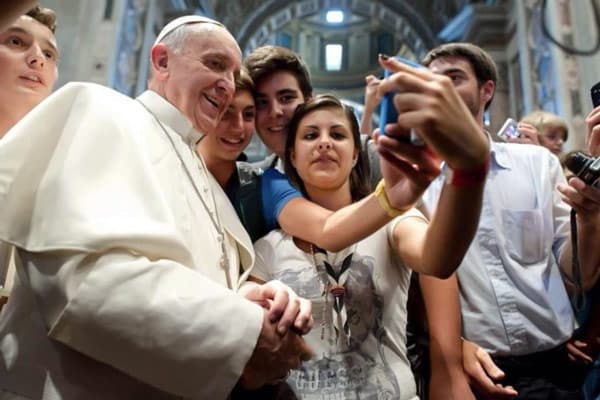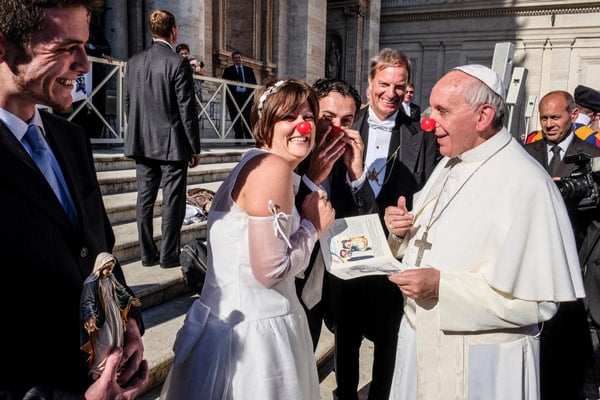Pope Francis (Francesco), whose birth name is Jorge Mario Bergoglio, was born on December 17, 1936, in Buenos Aires. He comes from a family of Italian immigrants, and his father worked for the railroad. He is the first head of the Catholic world from the New World and the first Jesuit Pope.
Page Contents
Biography
Ordination and Educational Activities
Bergoglio entered the Villa Devoto Seminary in Buenos Aires at the age of 22. In 1958, he joined the Society of Jesus (Jesuits). He underwent his novitiate and studied humanities in Chile. After returning to Argentina, he enrolled at St. Joseph’s College. Upon graduation with distinction, he taught humanities at colleges in Buenos Aires.
In addition to his native Spanish, he is fluent in Italian and German. The new Pope also has a secular education as a chemical technologist.
His ordination took place on December 13, 1969. As a true priest, Bergoglio was unpretentious and persevering, and he had good knowledge that he continuously improved. Thanks to these qualities, he soon became the rector of the college of St. Joseph, which he had once brilliantly graduated from. Then, after obtaining his doctoral degree in Germany, he became the director of the Cordoba Archdiocese.
High Positions in the Church Hierarchy
Bergoglio became the Primate of Argentina at the age of 61. In fact, he performed these duties for several years before assuming the office while serving as an assistant to Cardinal Antonio Quarracino. Here, his leadership skills and qualities inherent to a true father of the Church were fully revealed and duly appreciated.
In 2001, Pope John Paul II elevated Archbishop Bergoglio to the rank of cardinal. In this position, he held various posts in the Roman Curia.
The biography of the humblest of priests was not without clouds. In 2005, a scandal erupted. Criminal charges were brought against Cardinal Bergoglio. Human rights activist Myriam Bregman accused him of allegedly betraying two Jesuit priests to the junta in 1976. The version of the priest’s connection to the junta was not confirmed, and Judge Herman Castelli called the accusatory statement “a complete lie.”
In April of the same year, after the death of John Paul II, the cardinal participated in the Conclave as a papal elector. However, in the second round, the majority of votes were cast in favor of Joseph Ratzinger, who took the name Benedict XVI.
After Benedict’s resignation from the papacy on February 28, 2013, the Argentinean once again took part in the Conclave, this time with success. Catholics worldwide joyfully received the news that a humble cardinal from Latin America had become their shepherd.
Speeches
The new Pope of Rome is known not only as a talented leader but also as a brilliant orator. Pope Francis I’s speeches testify to his versatile mind and deep education. The range of issues that concern the Pope is wide and diverse: the possibility of a third world war, the troubled situation in Ukraine, interethnic relations, problems of sexual minorities, and illegitimate children.
- In a speech dedicated to the centenary of the start of World War I, Pope Francis I, calling for peace and unity, said that the third world war, whether we wish it or not, has already begun.
The evidence of this is the ongoing armed conflicts that shake the world, with the most prominent examples being Syria and Ukraine. He shared that his grandfather was a participant in World War I, after which he emigrated to Argentina. - One of the most heartfelt speeches by the Pontiff was delivered in the European Parliament. Raising his voice on behalf of the Church, the Pope spoke about the unacceptable nature of arms trade and human trafficking, emphasizing that democracy without a pursuit of truth descends into the swamp of universal selfishness.
Francis compared Europe to a poplar tree that withers without roots. “Where is your strength, Europe?” the head of the Catholic world questioned. According to the Pope, strength lies in a rational and respectful attitude toward historical heritage. - The speech about the Armenian genocide on April 12, 2015, caused outrage from the President of the Republic of Turkey, Recep Tayyip Erdoğan, with just the use of the word “genocide.”
The Vatican ambassador was summoned to the Turkish Ministry of Foreign Affairs in Ankara for explanations, while the Pontiff insisted that the events of 1915 marked the beginning of mass killings on a national basis, casting a shadow over the 20th century. In the Pope’s view, hidden evil can be likened to an “unhealed bleeding wound.”
Liturgy
The Roman Mass is an important part of the life of any person who professes Catholicism and can be an interesting spectacle for others. The official website of the Vatican provides a schedule of liturgies held in St. Peter’s Basilica. The Pope himself celebrates Mass only on holidays, and there are often many visitors, so it is recommended to arrive two hours before the start.
On Sunday mornings (at 11 o’clock), Pope Francis delivers the Angelus sermon from the window of his quarters to those gathered in St. Peter’s Square. Sunday is a special day for Christians, and everyone can see their shepherd and immerse themselves in an atmosphere of unity with their fellow believers.
Irish Prophecy
The prophecy of Saint Archbishop Malachy of Ireland states that the last Roman Pope, called Peter the Roman (Petrus Romanus), will rule “amidst many tribulations,” after which the Eternal City will face complete destruction.
It may seem that all of the above has no relation to the current Pontiff. However, interpreters of sacred texts have drawn an analogy by breaking down the Pope’s surname into two words – Berg and Oglio. Petrus (Latin) and Berg (German) both mean “stone,” while Oglio (Olio) is a river in Italy, one of the tributaries of the Po. Moreover, the Pope himself is an ethnic Italian! His secular surname can be interpreted as “a fortress in the stream.” Such reasoning may appear (and essentially are) debatable, but due to the multitude of coincidences between Malachy’s prophecies and facts about previous popes, some people find reason to claim that the ancient prophecy about Peter the Roman is being fulfilled by the Argentine cardinal.
Interesting Facts about Pope Francis
- He is the first Pope to choose the name Francis, inspired by Saint Francis of Assisi, known for his humility, simplicity, and love for nature. This name reflects Pope Francis’ commitment to living a humble and compassionate life.
- Pope Francis is known for his personal humility, rejecting luxurious apartments and a personal chef. Like his namesake, he is devoted to the ideals of evangelical poverty and leads by example.
- In his youth, Pope Francis worked as a bouncer at a nightclub. This surprising fact shows a different aspect of his life before entering the priesthood and becoming a prominent religious leader.
- He is a football fan and a supporter of the “San Lorenzo” club from Buenos Aires. This demonstrates his connection to the local culture and his ability to engage with people through shared interests.
- On the first Holy Thursday after his inauguration, Pope Francis washed the feet of 12 underage prisoners, including two girls from different religious backgrounds. This act of humility and inclusivity set an example of mercy and compassion, emphasizing the importance of caring for those in vulnerable situations.
- The English magazine “Time” named Pope Francis the “Person of the Year 2013.” This recognition highlights the global impact and significance of his papacy, particularly in promoting social justice and compassion.
- An email sent by the Pope caused a diplomatic scandal when he expressed his desire to prevent the “Mexicanization” of Argentina due to increasing drug trafficking. Although the controversy arose, the Vatican’s press office clarified that the personal letter should not be a reason for dispute, emphasizing the Pope’s concern about the dangerous effects of drug trade in Latin American countries.
Feedback – How to contact Pope Francis?
The Pontiff does not have a public email address. All messages to the Holy Father are sent to the following address: His Holiness Francesco, Casa Santa Marta, 00120 Città del Vaticano (Sua Santità Francesco, Casa Santa Marta, 00120 Città del Vaticano).
The format of the letter is free, and it is acceptable to write in your native language, addressing the Pope as “Your Holiness” or “Holy Father.” The Papal Court operates the Office of Correspondence, which consists of four individuals and is led by Monsignor Giuliano Gallorini (Giuliano Gallorini). This small department sorts through and reads the multitude of letters addressed to Pope Francis. Most often, they are the ones who write responses, strictly adhering to the papal style.
Only in the most difficult cases, when a letter contains complaints of great injustice and oppression, does the Pope respond personally.
To receive a special blessing from the Holy Father, you need to fill out a special form provided on the official website of the Vatican Apostolic Palace www.vatican.va. You can submit the completed form in three ways:
- Hand-deliver it personally or through a courier by going to the Gate of Saint Anne (l’Ingresso Sant’Anna) on the right side of Saint Peter’s Colonnade (open from Monday to Saturday from 9:00 am to 12:00 pm).
- Fax it to +39 32 06698831.
- Send it by regular mail to: Elemosineria Apostolica, Ufficio pergamene – 00120 Città del Vaticano (Apostolic Almoner, Office of Scrolls – 00120 Città del Vaticano).
The dates of papal audiences and the forms for participation can be found at the provided address. The completed form with the necessary information should be sent to the Prefecture of the Vatican or faxed to +39 63 06698858. It is necessary to indicate the type of audience and the number of participants. Tickets are issued at the office behind the Bronze Door, located to the right of St. Peter’s Basilica (Basilica di San Pietro).
For further details on the procedures of interest, you can contact the Prefecture of the Vatican by calling the following numbers: +39 76 06698848, +39 14 06698831, +39 73 06698832, from 9:00 am to 1:00 pm.
Papal audiences and blessings are free of charge.
 Italy for me From Italy with love
Italy for me From Italy with love

